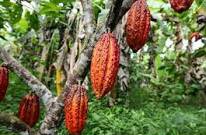News
PIND Leverages Mass Employment, Prosperity On Cocoa Value Chain

By Niyi Olutunde, Akure
Foundation for Partnership in the Niger Delta (PIND) has identified cocoa value chain potentials as viable catalyst to ending youth unemployment in the country.

Aside providing ample employment opportunities, especially among the youths, PIND noted that it will also ameliorate the drastic effects in the decline oil price globally on the nation’s economy.
The PIND Executive Director, Dr. Dara Akala, at the Cocoa Value Chain Study Validation Workshop in Akure, hinged the assurance on a recent analysis carried out on cocoa value chain in the country.
The Executive Director said it is imperative for key stakeholders to take advantage of the increased market opportunities in the sector, identifying key value chains and conduct cocoa stakeholders mapping.
There were 32 participants drawn across the Niger Delta states with review of reports on end market, aggregators, producers and support function.
“As Nigeria’s Cocoa production and export began to increase in 2017, the Foundation for Partnership Initiatives in the Niger Delta (PIND) carried out a value chain study of the sector between January and April 2018,” he said.
Akala noted that it is the tradition of the organisation in the Niger Delta region to gather stakeholders to validate the interesting findings from researches conducted into any area of focus.
According to him, PIND initiated the Cocoa Value Chain study to diagnose the cocoa sector with a view to understanding the structure of the industry in the Niger Delta.
He added that PIND, which is market-driven in its approach, prioritizes the drive to find and improve markets that offer jobs and income opportunities for the poor majority.
“It also identified investment opportunities in the industry, the competitiveness of the region’s cocoa economy and the gaps and areas in need of intervention for sustainability and effective linkage with the global cocoa value chain.”
He disclosed that “2017 saw an increase in the quantity of cocoa exported from Nigeria, rising from about 250,000 tonnes exported in 2016 to more than 300,000 tonnes in 2017.
“The increase was triggered by the devaluation of the Naira in 2016 by the Nigerian government in a bid to wade off recession.
“While the devaluation of the Naira and subsequent increase in tariffs or outright ban of certain imported goods led to a 30% loss in the value of Nigeria’s currency in comparison to the United States of America’s Dollar.”
Nonetheless, he stated that products like cocoa enjoyed increased demand and production because of its viability as an export product.
As partnership initiative, he said PIND is building a strong synergy with government at all levels and stepping up relationship with the public and private sector, especially critical stakeholders.
“The findings from the study will be validated with stakeholders including farmers, intermediate and final processors, aggregators, exporters, Business Membership Organizations (BMOs), financial institutions, government agencies, input companies and regulatory organisations.
“No single stakeholder, agency or entity can tackle the development challenges all alone. At the Federal Government and state levels, we have been talking to all these stakeholders and exploring opportunities for collaboration,” he said.
The PIND Market Development Projects Manager, James Elekwachi, said ‘’cocoa sector has the growth potential and the opportunity to increase income and employment for millions of people, especially the unskilled and semi-skilled in the region.”
Elekwachi, who led the value chain study, said “improvement in the production of cocoa can effectively mitigate the poverty level in Nigeria and especially in the Niger Delta region since seven of the 14 producing states are in the Niger Delta region.’’
He added that cocoa can effectively replace oil with more opportunities as demonstrated in other economies with proper focus on production of commodities of large scale commercial values.
Following the validation of the findings and finalization of the study report, they added that the findings from the cocoa value chain study will be disseminated to a wide range of stakeholders in the third quarter of 2018.
The report, the PIND officials, said will “inform and influence interventions and policies aimed at enhancing the market opportunities in the sector to make it more lucrative for the market actors in the Niger Delta region and in Nigeria.”
While the governor of Ondo State, Oluwarotimi Akeredolu, revealed that the state government has embarked on several revolutionary measures to optimally utilize the cocoa potentials in the state for massive development.
Akeredolu, who was represented by the Senior Special Assistant to the Governor on Agriculture and Agric Business, Pastor Akin Olotu, lamented that cocoa in the state is being developed to take over oil.
Olotu disclosed that the present administration had made available 500,000 cocoa seedlings and stepping up efforts to consolidate on the Cocoa Revolution Project (CRP) and its products that got international recognition.
He stressed that the state government has earmarked billions of naira for the infrastructural development of Oda Cocoa Settlement and the Cocoa Catalytic Industry in the state to consolidate on the X-Premium cocoa that became second best cocoa globally.











